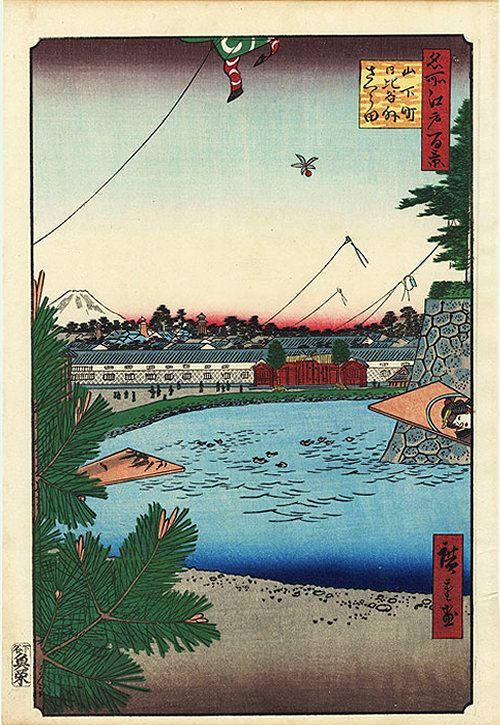| |
Hiroshige(1797 - 1858)Hibiya and Soto-Sakurada from Yamashita-cho("Benkei Moat") |
|

just click on woodblock, to see photo of 2012
Hibiya and Soto-Sakurada from
Yamashita-cho ("Benkei Moat")
(山下町日比谷外さくら田 Yamashita-chō Hibiya Soto-Sakurada)
Series: One Hundred Famous Views of
Edo
(名所江戸百景 Meisho Edo Hyakkei)
Uo-ya Eikichi 1918 Edition Print
Comment -
A Hiroshige print, depicting a festive atmosphere on
New Year's Day at outer moat of Edo Castle ("benkei" moat). In
the foreground, two celebrants play battledore and shuttlecock
("Hanetsuki") by the moat. Kites fly
above the city, the most prominent on the upper rim of the
print is a Yakko
("yakko-dako", "奴凧") or man kite (servant kite). The
background shows three Edo
kites ("Edo-tako", "江戸凧") with their long tails. One Edo
is hanging upside down, caught in a kite line. The Hanetsuki rack
("hagoita", 羽子板), the Kadomatsu pine, and the kites indicate a
setting around New Year's Day. These pasttimes are often
played during these days. Mount Fuji rises majestically in the
distance. Across the Benkei Moat, running the length of the
print, Hiroshige illustrates the impressive gate and front
wall of a daimyo mansion,
residence of daimyo Nabeshima Kansō from the Saga Domain. The Nabeshima clan
(鍋島氏 Nabeshima-shi) controlled the Saga Domain from the late
Sengoku period through the Edo period.
This broad, gently curving stretch of water
represents a segment of the great inner moat of Edo Castle (see
photo of 2012). The red-gated mansion to the upper left
belonged to Ii Naosuke, one of the shogun's closest political
advisers. It was along the road to the lower left that he was
assassinated by a group of hot headed young loyalist samurai
as he proceeded from his mansion to Edo Castle on a snowy day
in early 1860.
A copy
of an unknow Meiji-Era artist featuring the same scene
is to be found at this link.
Another version of this successful Series,
depicting about the same scene in "landscape" (horizontal)
version, is to be found as "Outside
Hibiya, Seen from Sukiya-gashi" (1858), from the series
"Famous Places in Edo" ("Edo meisho", 江戸名所).
Reprint - These 1918
prints are from a beautiful posthumous release of HIROSHIGE's
prints by the original series publisher Uo-ya Eikichi. In 1918
Uo-ya Eikichi re-released a complete set of HIROSHIGE's "One
Hundred Famous Views of Edo" in a small edition, with prints
of the highest quality rivaling those of the lifetime edition.
Using only the most skilled printers and carefully matching
the paper and inks to the Edo era printing, Uo-ya Eikichi used
many original blocks, supplementing them when necessary by
replacements. This masterwork series includes some of
Hiroshige's most famous and memorable subjects.
Series - "The
print is the Number 3 of the series "One Hundred Famous Views
of Edo" (名所江戸百景 Meisho Edo Hyakkei). Two other woodblocks from
the same series, containing kites are "Kasumigaseki" and "Mount Atago in
Shiba". For information about other Series of Hiroshige,
refer to HIROSHIGE's "Tokaido"
and other Series.
Artist - see Biography
Signature - Hiroshige ga (広重画) lower right, red cassette
Publisher - Uoya Eikichi (魚屋 栄吉) <Sakana Sakae,
魚栄>; lower left selvage
Image Size - 21.9cm X 33.7 (8 5/8" x
13 1/4") + margins
Condition - single sheet; nishiki-e (cloured
woodblock); Vertical ôban; Tate-e (portrait)
Copyright 2008 ff: Hans P. Boehme